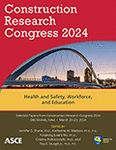The Evolving Career Aspirations of Socially Minded Engineering and Construction Students
Publication: Construction Research Congress 2024
ABSTRACT
Humanitarian engineering (HE) programs are growing exponentially to meet the rising demand of engineering and construction students wanting to address equitable infrastructure service provision. This field is attracting students traditionally underrepresented in engineering and construction, including those of diverse backgrounds, identities, and passions. However, there is a dearth of research tracking students’ evolving career aspirations through the influences of graduate school. This study conducts longitudinal interviews with seven students enrolled in seven graduate HE programs over two years. Through these interviews, students’ career aspirations were collected and qualitatively coded, including desires around impact, daily tasks, work environment, location, and compensation. The study identified three expectation patterns of shifts in career interests over a graduate education. This ongoing analysis will address the shortage of research on the career pathways of socially minded engineering and construction students. Results will be valuable for programs to support and meet the changing needs and aspirations in these fields.
Get full access to this article
View all available purchase options and get full access to this chapter.
REFERENCES
Adams, E. A., and M. B. Burgoyne. 2017. “Integrating Humanitarian Engineering Design Projects to Increase Retention of Underrepresented Minority Students and to Achieve Interpersonal Skill-Related Learning Outcomes.”
Barrington, L., and J. Duffy. 2007. “Attracting Underrepresented Groups To Engineering With Service Learning.” 2007 Annu. Conf. Expo. Proc., 12.298.1–12.298.41. Honolulu, Hawaii: ASEE Conferences.
Boy, G. A. 2021. Design for flexibility [electronic resource] : a human systems integration approach/Guy André Boy. Springer.
Brubaker, E., M. Schar, and S. Sheppard. 2017. “Impact-Driven Engineering Students: Contributing Behavioral Correlates.” 2017 ASEE Annu. Conf. Expo. Proc., 28473. Columbus, Ohio: ASEE Conferences.
Budny, D., and R. T. Gradoville. 2011. “International Service Learning Design Projects: Educating Tomorrow’s Engineers, Serving the Global Community, and Helping to Meet ABET Criterion.” Int. J. Serv. Learn. Eng. Humanit. Eng. Soc. Entrep., 6 (2): 98–117. https://doi.org/10.24908/ijsle.v6i2.3548.
Burleson, G., et al. 2023. Engineering Workforce Advancing Sustainable Development. White Paper. ASME.
Geiger, R., S. West, E. Peiffer, M. Stettler Kleine, and J. Lucena. 2021. Mapping Engineering For Good Career Pathways: Examples From North America. Engineering for Change, ASME, Colorado School of Mines.
Kaminsky, J., and A. Javernick-Will. 2015. “Theorizing the Internal Social Sustainability of Sanitation Organizations.” J. Constr. Eng. Manag., 141 (2): 04014071. American Society of Civil Engineers. https://doi.org/10.1061/(ASCE)CO.1943-7862.0000933.
Kofman, J. 2023. “Trint.”
Lent, R. W., D. Singley, H.-B. Sheu, J. A. Schmidt, and L. C. Schmidt. 2007. “Relation of Social-Cognitive Factors to Academic Satisfaction in Engineering Students.” J. Career Assess., 15 (1): 87–97. Thousand Oaks, CA: Sage Publications. https://doi.org/10.1177/1069072706294518.
Litchfield, K., and A. Javernick-Will. 2015. “‘I Am an Engineer AND’: A Mixed Methods Study of Socially Engaged Engineers.” J. Eng. Educ. Wash. DC, 104 (4): 393–416. Washington: Blackwell Publishing Ltd. https://doi.org/10.1002/jee.20102.
MacDonald, L., et al. 2022. “Aligning learning objectives and approaches in global engineering graduate programs: Review and recommendations by an interdisciplinary working group.” Dev. Eng., 7: 100095. https://doi.org/10.1016/j.deveng.2022.100095.
Mehta, K., and I. Gorski. 2016. “Preparing engineers for careers in social innovation and sustainable development.” 2016 IEEE Front. Educ. Conf. FIE, 1–5.
Niles, S., S. Contreras, S. Roudbari, J. Kaminsky, and J. Harrison. 2018. “Bringing in ‘The Social’ : Resisting and Assisting Social Engagement in Engineering Education.” 2018 World Eng. Educ. Forum - Glob. Eng. Deans Counc. WEEF-GEDC, 1–6.
Richards, L., and T. Richards. 2022. “Nvivo.”
Smith, J., A. L. H. Tran, and P. Compston. 2020. “Review of humanitarian action and development engineering education programmes.” Eur. J. Eng. Educ., 45 (2): 249–272. Taylor & Francis. https://doi.org/10.1080/03043797.2019.1623179.
Swan, C., K. Paterson, and A. R. Bielefeldt. 2014. “Community Engagement in Engineering Education as a Way to Increase Inclusiveness.” Camb. Handb. Eng. Educ. Res., A. Johri and B. M. Olds, eds., 357–372. Cambridge: Cambridge University Press.
U.N. 2013. United Nations Millennium Development Goals. United Nations.
Information & Authors
Information
Published In
History
Published online: Mar 18, 2024
ASCE Technical Topics:
Authors
Metrics & Citations
Metrics
Citations
Download citation
If you have the appropriate software installed, you can download article citation data to the citation manager of your choice. Simply select your manager software from the list below and click Download.
